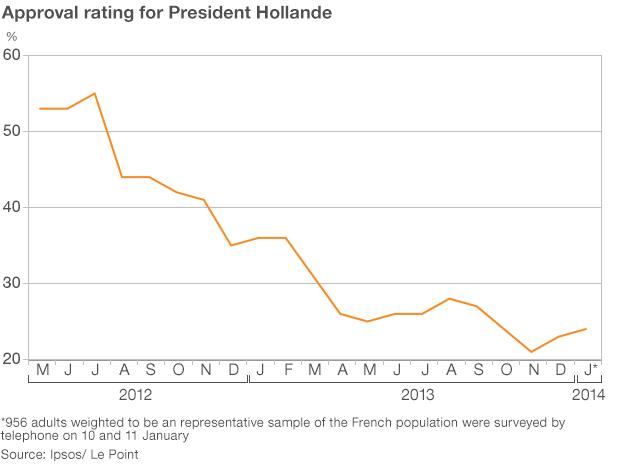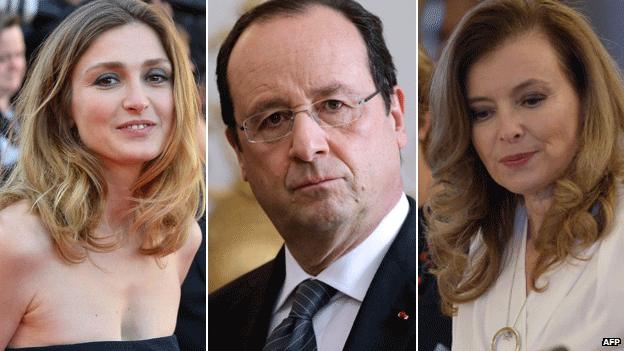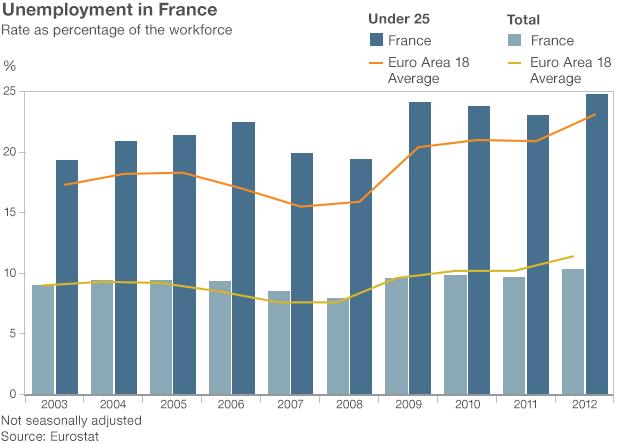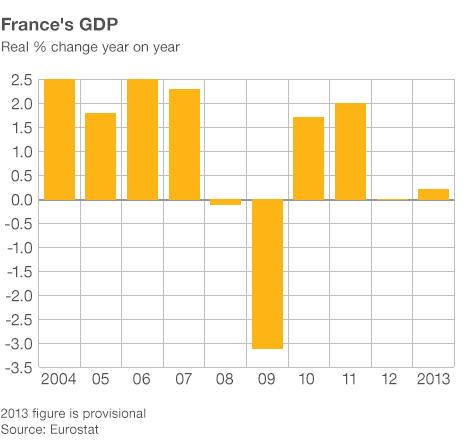Hollande ducks First Lady Valerie Trierweiler question
- Published
Francois Hollande: "Private matters should be dealt with privately"
French President Francois Hollande has said he is experiencing a "difficult moment" in his private life, following claims of an affair with an actress.
But he refused to answer questions over the report, saying "private matters should be dealt with privately".
Mr Hollande was speaking at his first news conference since the allegations in the magazine Closer last week.
He said he would clarify whether Valerie Trierweiler was still first lady before a February trip to the US.
He plans to travel to Washington on 11 February.
The news conference was a long-planned event aimed at unveiling policies to help France's struggling economy.
In a speech lasting more than half an hour he addressed the main areas where business wants to see reform.
Facing hundreds of journalists at the presidential palace, Mr Hollande said it was "neither the time nor the place" to answer questions about his personal life.
He said he would not be drawn on the reports of the affairs with actress Julie Gayet "out of respect for those involved".
Ms Trierweiler has been in hospital since Friday suffering from "shock", her aides say.
Asked about the state of his partner's health, Mr Hollande said she was resting and that he had no further comment to make on the subject.
On the issue of his personal security - which some reports of his affair suggested had been compromised - Mr Hollande said: "When I travel officially and when I travel on a private basis, I have protection that is less suffocating. But I am protected everywhere.''
The president left open the possibility of suing Closer over its report.

Economic pledges
In his New Year's address, Mr Hollande outlined ideas to combat unemployment - a key pledge in his campaign.
The recurrent criticism of economic policy in France is that government is too big and the burdens of tax and regulation - especially in the jobs market - are excessive.
He promised to slash 50bn euros (£41.5bn) in public spending over three years.
The president also gave more details on a proposed "responsibility pact" that would introduce tax cuts for firms in return for a commitment to hire more workers.
Analysts say the impact will, however, depend on how effectively these, and other commitments, can be implemented.
France is struggling with weak economic growth and persistent high unemployment.
Figures from October showed that 3.27 million people were out of work - 10.3% of the workforce.
Sliding popularity
There is a public interest in the infidelity allegations by Closer where they relate to Ms Trierweiler's status as first lady.

Mr Hollande's "official" partner is Valerie Trierweiler (r), but he is alleged to have had an affair with Julie Gayet (l)
She has an office in the Elysee Palace with six staff, which is supported by public money.
The French media face strict privacy laws, but the tradition of secrecy over the private lives of public figures has been steadily eroded in recent years.
On Friday, Closer printed a seven-page article about the alleged affair between Mr Hollande and Ms Gayet.
It was illustrated with photos showing a man said to be the president visiting a flat near the Elysee Palace at the same time as Ms Gayet.
Mr Hollande, who has never married, left his previous partner, fellow Socialist politician Segolene Royal, to be with Ms Trierweiler.
The scandal comes at a difficult time for Mr Hollande, with opinion polls already suggesting he is one of the most unpopular French presidents ever.


- Published14 January 2014
- Published14 January 2014
- Published14 January 2014
- Published13 January 2014
- Published13 January 2014